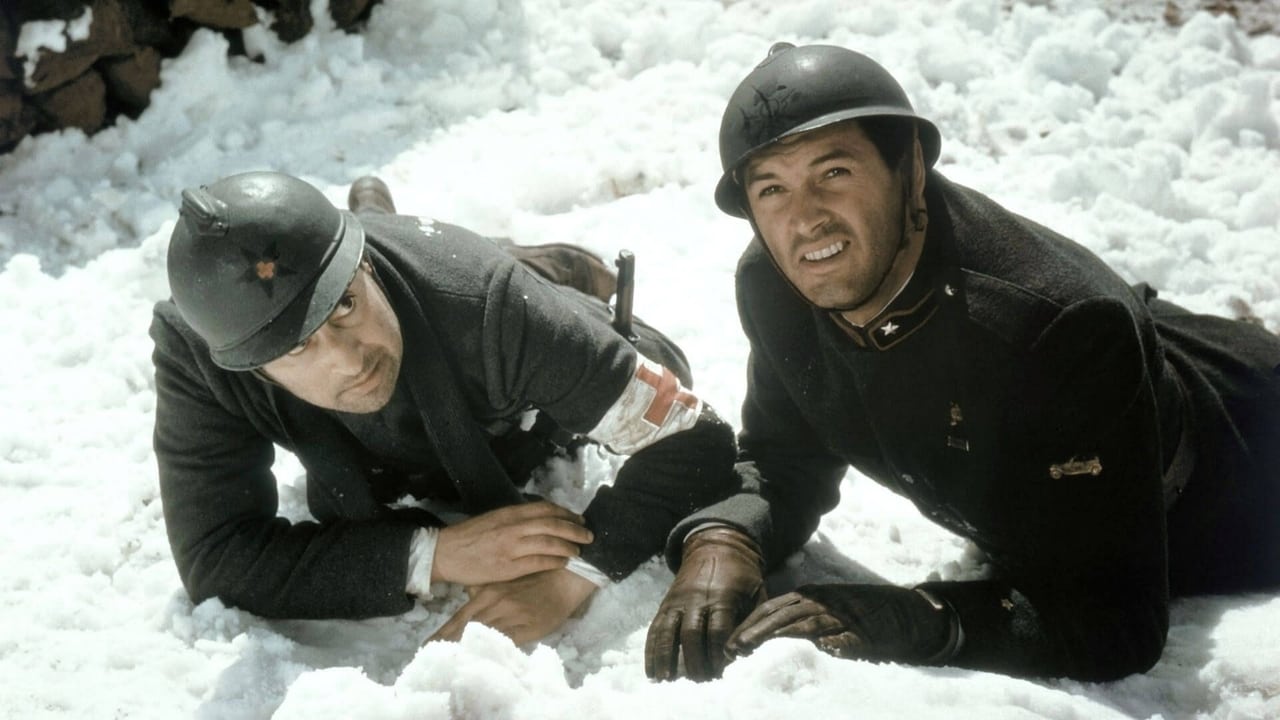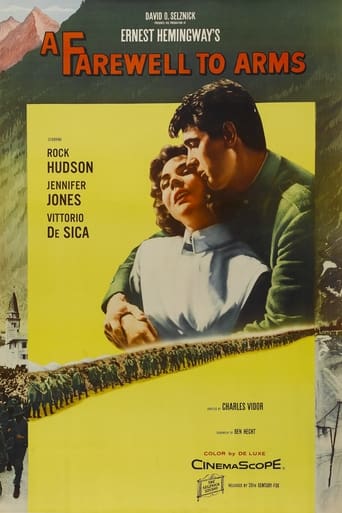

Two days before shooting was due to commence on the David O. Selznick remake of Ernest Hemingway's A Farewell to Arms ('57), director John Huston left the set in the Italian Alps, following a disagreement with the producer. At a press conference a few weeks later, Selznick explained that singly their differences would sound trivial, but there were "hundreds of them". Calling Huston "a talented man", the producer said there are certain men who ought to do their own producing. Selznick's definition of a producer's duties was that he supervise "every camera set-up, every frame". He said his understanding with Charles Vidor, who replaced Huston, was complete. Nevertheless, he added that there was need for more rugged individuals (indicating Huston and himself) making movies. Beyond Farewell, Selznick enumerated his future plans as package deals with 20th-Fox for Tender Is the Night and Mary Magdalene; developing Gone With The Wind as a stage operetta; and a TV spectacular of Rebecca, sometime within the next two years.Between Huston's desertion on 22 March 1957, and Vidor's appointment on 5 April, the film had been carried on by second unit director Andrew Marton, who had completed shooting all the film's major battle scenes - involving 14,000 soldiers and 2,000 mules and horses - before Vidor arrived at the Udine location.Although more faithful to Hemingway than the earlier version with Gary Cooper and Helen Hayes (in that film, Henry deserted because he suspected that Rinaldi was having an affair with Catherine), Selznick's remake entirely fails to capture the spirit of the novel. One example will perhaps suffice to show how thoroughly the film overdoes things. The last line of the novel reads: "After a while I went out and left the hospital and walked back to the hotel in the rain." In the overdone film, however, Rock Hudson walks out of the hospital; we hear music, and then the voice of Jennifer Jones. Next we have a brief flashback in which Jones says, "We're going to have a strange life, but it's the only life I want." The flashback fades out, a heavenly choir fades in, and we see the early morning sun as Hudson retreats down a long avenue. Then it begins to rain. Overdone!Another example: Vidor seems to have mistaken the retreat from Caporetto for the flight from Atlanta, and has tried to make a Technicolor epic out of black-and-white non-epic material. He is not helped, either, by the playing. Rock Hudson is not an actor who can quote Andrew Marvell and get away with it. Jennifer Jones unleashes too much hysterical emotion at the beginning of the film to have any reserves left for her ordeal at the end. Worst offender of all is Alberto Sordi, the wonderful comedian of La Bella di Roma, who is utterly out of his element as a sort of European version of a Bing Crosby priest.On completing A Farewell to Arms, Vidor gave himself an extended vacation. In May 1958, he turned up on the international jury of the eleventh Cannes Film Festival, where he distinguished himself by protesting against the screening of Anthony Asquith's Orders to Kill.But Charles Vidor was usually quiet-spoken and congenial; although he was always annoyed that pressmen persistently quoted him as saying that the thing of which he was most proud was not his hard-earned success but the fact that he was the best English-speaking Hungarian in Hollywood. This was a tilt at Michael Curtiz that Vidor never meant to be taken seriously.In Vienna for background filming on Columbia's Song Without End, Charles Vidor suffered a sudden and fatal heart attack in his hotel room on the night of 4 June 1959. He was only 59 years old.His body was buried at the Los Angeles Home of Peace Mausoleum the following 11 June, while Jack Benny delivered the eulogy at a memorial service in the Wilshire Boulevard Temple.
... View MoreI managed to avoid reading Hemingway in college. From what I could tell, along with his reductivist verbiage, he offered reductivist story lines. This film-transfiguration of AF2A into a simplistic, hoary, belabored narrative, does not disabuse me of my suspicions: A guy who barely sees action on the European battlefield (Hudson) falls in with a nurse (Jones), and they conspire to spend time together. Hemingway's big contribution to narrative was the romantic travelogue? Who knows what these two lovers have in common? They're so utterly generic. The movie never even brings up the utter irresponsibility it takes to abandon the front in favor of a lovers' adventure. The two have a season on the Alps, straight out of a J. Crew catalog. A number of better scenes are undermined by corny, conventional melodrama elsewhere. The movie keeps piling on tiny, improbable, unspecific details that fight the epic treatment. The cavernous hospital that Miss Barkley works in is virtually empty, so that no secondary plot line can possibly distract from the flimsy main story. Complicated, it is not. The camera work is better than average, with some amazing location photography. Director Charles Vidor (or maybe Huston?) does striking things in the first hour with an on-location, wide-screen camera... there are no second unit cop-outs. Vidor shows massive, panoramic tableaux, pans over a line of hundreds of soldiers trooping through the mountains; and then with a 90 degree swivel of his camera catches up with Hudson's ambulance barreling down on him. Hudson looks great. He's a better actor than he gets credit for, but with unshaped material like this, he can become very mechanical. Mercedes McCambridge plays a one-dimensional shrew. Jennifer Jones is puffy and miscast in the lackluster female lead. The movie is best when she's off screen. The love scenes are about as affecting as a coffee commercial.
... View MoreA lot of people are being terribly unfair to this production of A Farewell To Arms. Not that it's a great film, it misses that by a good distance, but that even films that are the best adaptations of Ernest Hemingway's work fall far short for Hemingway purists. And David O. Selznick was far from a Hemingway purist.No Selznick when it came to the career of his wife Jennifer Jones lost all kinds of sense of balance. Another reviewer was quite right, Jean Simmons, Joan Collins, Elizabeth Taylor all would have made acceptable Catherine Barkleys.One thing also to remember that we're not even starting out with pure Hemingway to begin with. Both this version and the 1932 version that starred Gary Cooper and Helen Hayes are not just based on the novel, they are based on a play that was adapted from the novel by Laurence Stallings who wrote What Price Glory. The play ran for 30 performances in 1930 and starred Glenn Anders and Elissa Landi on Broadway. I suspect the Depression had a lot to do with the closing as it did many shows that year.Originally John Huston was slated to direct and he had directed Jones in both We Were Strangers and Beat The Devil with little or no interference from Selznick. But Selznick fired Huston and replaced him with Charles Vidor because allegedly too much attention was paid to Rock Hudson and not enough to Jennifer.That's ironic as all get out because the novel itself is as all Hemingway works is male chauvinistic in the extreme. If he wanted to showcase Jennifer, any Hemingway just ain't the vehicle. He should have used one of the Bronte sisters.Since the novel is male oriented Rock Hudson makes a fine Fredric Henry, the idealistic man who volunteers on the Italian front as an ambulance driver to experience war so he can write about it when it's over. On that Italian front it didn't look like it was ever going to be over. That's another problem with this work, how do you sell it to the movie going public, as a romance or an anti-war tract? If you're Adolph Zukor for Paramount or David O. Selznick probably romance is the aspect that does sell. The third major character in the film is that of the Italian army doctor Major Rinaldi played here by Vittorio DeSica. This version is more faithful to the book and presents Rinaldi as a three dimensional character.In the 1932 version Adolphe Menjou was Rinaldi and Menjou did fine with the part as your typical suave continental type. Here Rinaldi's outspokenness about the futility of the Italian campaign leads to tragedy. It also led to an Oscar nomination for Vittorio DeSica as Best Supporting Actor. It was the only recognition A Farewell To Arms got from the Academy and DeSica lost to Red Buttons for Sayonara.Whether Huston or Vidor did them, the battle scenes and the scenes of retreat are shattering and moving. Given the unique problems of Hemingway and Selznick, we're lucky the film came out as good as it did.
... View MoreThis film should be called adventures in Cinemascope. It is like the screenwriter and director tooks the Cliff's Notes page 3 outline and decided that this would be a great vehicle for a film about the Italian Alps. Rock Hudson is pretty good here, but the dialogue bears no resemblance to Hemingway at all. This is a made up version of Hemingway. Hecht, the screenwriter, is a hack. Watch the 1932 version with Gary Cooper and Helen Hayes. That is great cinema and was made by someone who understood Hemingway and the war in Northern Italy. Gary Cooper is very, very good compared to his performance in For Whom the Bell Tolls where he is stiff as a board and thinks he is in a western.Anyway, if you are a Hemingway fan, do yourself a favor and do not watch this film. Your best bet is to get the unabridged audio CD and just listen to one of the greatest novels ever written.
... View More